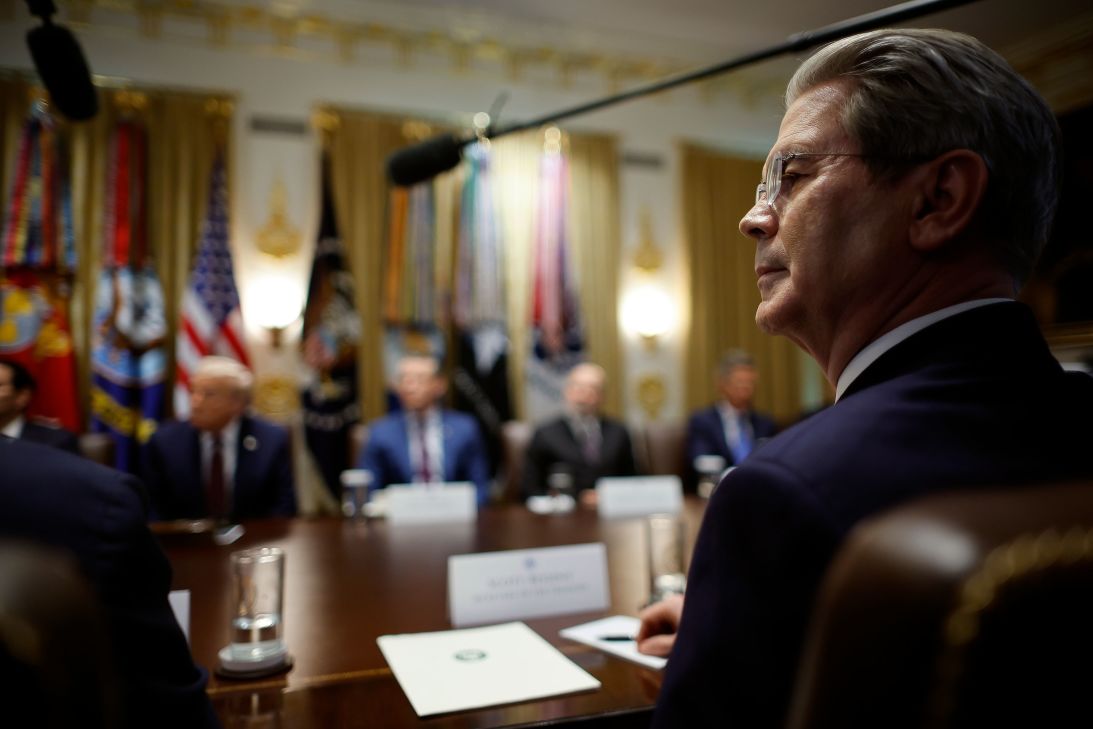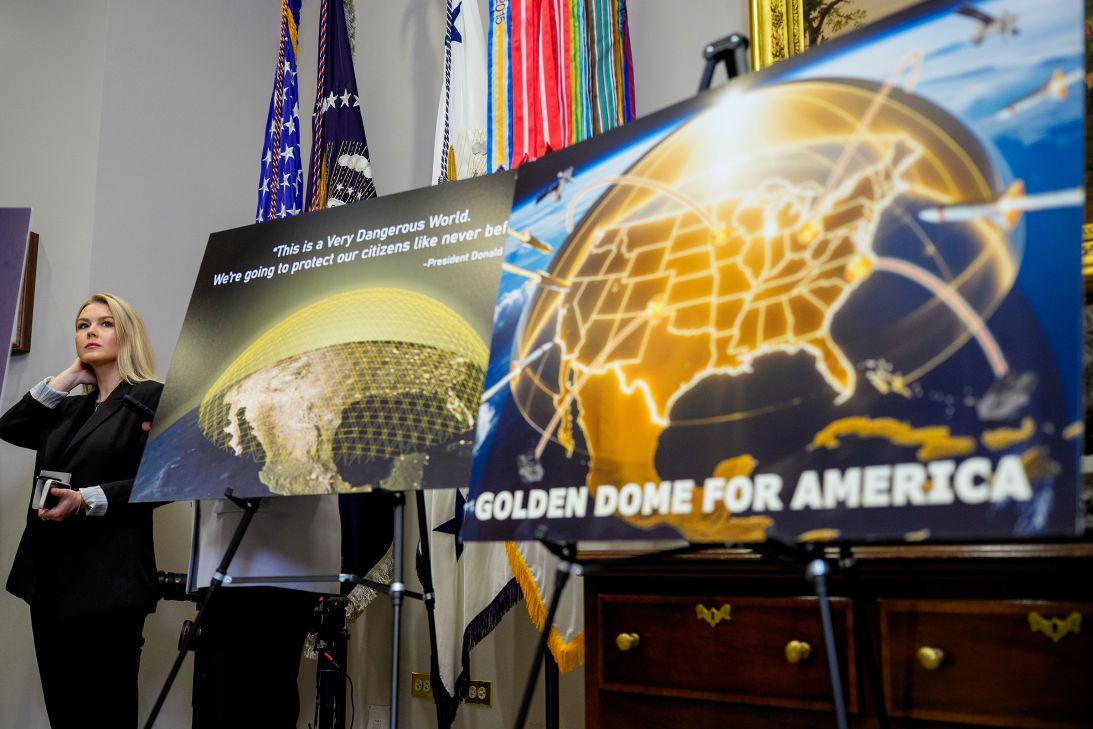Every single official in the executive branch is required, under penalty of potential prison, to avoid financial conflicts of interest. But two people are exempt: President Donald Trump and Vice President JD Vance.
This decades-old “presidential exemption” to the federal criminal conflicts-of-interest law has created a bizarre dynamic where Trump openly flouts ethics norms while his Cabinet members, top White House advisers and appointees throughout the federal government jump through hoops to deconflict – either through divestments or recusals.
Seven months into Trump’s tenure, he has brazenly blended his business interests with the presidency by having his administration accept a $400 million luxury jet from Qatar, dining with wealthy investors for in his cryptocurrency coin, selling a Trump-branded smartphone, promoting his Scotland golf properties, and more.
“The presidential exemption in the law undermines public confidence in the government,” said Richard Painter, the top ethics lawyer in the Bush White House, who later left the Republican Party. “Every other president since the Civil War voluntarily avoided conflicts. They understood how important this is.”
When it comes to Trump’s appointees, “they are bound by the criminal statute, and I think they are probably trying to comply,” Painter added.
For instance, Treasury Secretary Scott Bessent says he has divested 96% of the holdings he is required to shed, which is no small feat for a former hedge fund manager with nearly $1 billion in assets. Yet, he was still dinged earlier this month by the federal government’s ethics watchdog for failing to “timely comply” with his full divestment plan, according to letters obtained by CNN and previously reported by The New York Times.
CNN has reviewed additional internal government emails and financial disclosures showing that other senior Trump officials and nominees from the Pentagon and Office of Management and Budget have taken significant steps this year to comply with ethics rules.
This includes divesting large stakes in defense contractors, recusing themselves from decisions involving past employers, winding down other investments, and getting sign-off from career ethics officials, according to the documents.
“The law isn’t designed to prevent the cozy relationship this administration, and administrations from both parties, have with companies,” said Donald Sherman, executive director and chief counsel at the liberal-leaning watchdog group Citizens for Responsibility and Ethics in Washington. “But it’s always good news when federal officials recuse from projects where they have an obvious conflict.”
‘Carveouts’ for POTUS and VP
The existing federal ethics regimen long predates Trump. It was largely created after Watergate, with laws passed by Congress, and norms that past presidents voluntarily upheld.
While drafting federal conflicts laws, policymakers created “carveouts” for the president and vice president so they could work on anything that came across their desk, said Don Fox, the former acting director and general counsel of the Office of Government Ethics, or OGE, the federal government’s internal ethics watchdog.
“It made a lot of sense in theory, and it has made a lot of sense for past presidents, until Trump,” said Fox, who was at OGE during the Bush and Obama administrations from 2008 to 2013. “Bush and Obama behaved and conducted themselves as if they were subject to the law. Trump has viewed it more as an opportunity to exploit a loophole.”
When previously asked by CNN about Trump breaking ethics norms, a White House spokesman has said Trump is “restoring the integrity of the Executive Branch” by being the “most transparent” president in US history.
In January, the Trump Organization announced an ethics plan that stated Trump would “have no involvement” in the management of his business empire. But the plan didn’t call for him to divest from anything or recuse himself from any matters.
His private lawyers noted at the time that, “neither federal law nor the United States Constitution prohibits any President from continuing to own, operate and/or manage their businesses, investments, and others’ assets while in office.”
That’s true for Trump, but everyone else in the administration must take steps to avoid a conflict of interest.
“In fairness, there are people in this administration who made tremendous financial sacrifices to take these jobs,” Fox said, nodding to Bessent and others. “But the tone is set at the top, and Trump sets a terrible example.”
Bessent’s soybean farm
As the Treasury chief, Bessent has played a leading role with the Trump administration’s messaging on tariffs, tax cuts, and beyond. Behind the scenes, he has been divesting his vast financial holdings, including from more than two dozen companies involving energy, bitcoin and telecom.
OGE, the federal ethics agency, recently notified senators that Bessent wasn’t moving quickly enough to reach 100% divestment compliance.
A top OGE official wrote in the August 11 letter that they’ll monitor the situation and told Treasury officials to “emphasize” to Bessent that “it is his personal responsibility” to avoid conflicts and stay recused from matters related to the assets, the letter said.

The remaining assets mainly include a stake of up to $25 million in a soybean and corn farm in North Dakota. Treasury officials told OGE in a follow-up letter obtained by CNN that these are illiquid and “not readily marketable” assets, but that Bessent has been working all year to find a buyer.
“I gladly divested from more than 90% of the assets I was required to sell before I even assumed office,” Bessent said in a statement provided to CNN. “At this point just 4% of my required divestitures remain, much of which is farmland, an inherently highly illiquid asset… As agreed upon with OGE, I am working towards selling the rest of my required divestitures before the end of this year.”
Even if Bessent is 96% divested from his nearly $1 billion portfolio as this point, “what’s 4% of a billion?” asked Sherman, of the liberal-leaning ethics group CREW. “That’s still a lot of money, to anybody that’s not in Donald Trump’s cabinet or on his call sheet.”
“Full compliance is what’s required,” Sherman said.
Untangling from defense contractors
CNN has also learned that two top officials at the Office of Management and Budget, or OMB, have taken steps to avoid conflicts of interest with major defense contractors, and the agency says they have followed all required ethics rules.
Thomas Williams, OMB’s associate director for defense spending, started the year with an interest of between $2 million and $10 million in Palantir stock through his wife, who previously worked there, according to his federal ethics disclosures.
But after meeting with career federal ethics officials in February, he notified them, “I will recuse myself from matters involving” six companies, including Palantir, according to documents reviewed by CNN.
This recusal is notable because Palantir is a major government contractor and is aggressively eyeing additional deals as part of the Trump administration’s Golden Dome missile shield project, which could cost up to $500 billion

An OMB spokesperson told CNN in a statement that Williams “went through the same process as every OMB employee, supervised by OMB ethics attorneys, to ensure that they are in full compliance with all ethics rules.”
This is an example of how administration officials are working behind the scenes to deconflict their business interests from their government duties in compliance with the law, which simultaneously exempts Trump and Vance from needing to take similar steps. Yet, officials aren’t mandated to publicly reveal divestments in real-time or announce recusals, making it difficult for outside watchdog groups to do timely and comprehensive oversight.
The potential conflicts of interest at OMB were first flagged by the Project on Government Oversight, or POGO, a nonpartisan ethics group, which released a report Monday highlighting Williams and another top OMB official, Greg Barbaccia, who is the federal government’s chief information officer and self-proclaimed “chief AI officer.”
The POGO report cited financial disclosures from February showing Barbaccia had up to $250,000 in investments in Anduril Industries, another defense contractor that is vying for Golden Dome deals.
But like Williams, it turns out that Barbaccia had informed federal ethics officials months ago about his deconfliction plan. He told them in March that he was fully divested from Anduril, according to documents reviewed by CNN.
“Not recusing or divesting could have led to conflicts of interest in the performance of their jobs,” POGO’s director of investigations and research Brandon Brockmyer said in a statement about the two OMB officials. “The actions of these officials still warrant scrutiny to ensure they are complying with their ethical obligations.”
Army nominee divests
Federal records indicate that Trump’s nominee for Army Under Secretary, Mike Obadal, also had between $250,001 and $500,000 of stock in Anduril, where he worked since 2023.
He has pledged to recuse himself from Anduril-related matters, and informed ethics officials last week that he was now fully divested, according to a letter obtained by CNN. A Pentagon ethics official said on August 18 that Obadal was “in compliance” with the conflict laws and regulations, according to a letter seen by CNN.
Obadal is still awaiting Senate confirmation. He declined to comment for this story.
“The steps Mr. Obadal is taking are wise if he wants to avoid ethics questions about his decision-making,” said Nick Schwellenbach, a senior investigator at POGO, who scrutinized Obadal’s potential financial conflicts. “And that’s a good thing.”



